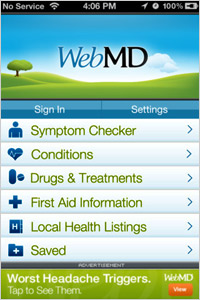 More people than ever are using their cell phones to get health information. The share of mobile users doing so has gone up to nearly a third (31%) from 17%
two years ago, according to a new survey from the Pew Research Center’s Internet & American Life Project.
More people than ever are using their cell phones to get health information. The share of mobile users doing so has gone up to nearly a third (31%) from 17%
two years ago, according to a new survey from the Pew Research Center’s Internet & American Life Project.
Smartphones are driving most of that activity. More than half (52%) of smartphone owners are looking up health information on their devices, compared to just 6% of regular cell phone users.
Younger, better-educated adults, minorities and caregivers are also more likely to use their phones to get health information.
M-health has long been seen as an area of opportunity for health
providers, pharmaceutical companies and other industry marketers. A GSMA forecast estimated the mobile health market would grow to $23 billion by
2017 across mobile operators, device vendors, health providers and publishers.
advertisement
advertisement
The Pew report identified certain demographic groups as heavier mobile health users: African-Americans, college
graduates, women, those with an annual household income between $50,000 and $74,999, and those between 30-49.
Pew estimates that 84% of smartphone owners have downloaded an app of any kind.
But only 19% have downloaded an app specifically to track or manage health. Women, those under age 50, the better-educated, and those with an annual household income over $75,000 are more likely to
have downloaded a health app.
Given increased public awareness about tracking of app use by developers and third parties, it’s possible privacy concerns play a role in holding back
downloading of health-related apps. A separate Pew report released in
September found privacy considerations are leading most app users (57%) either to remove particular apps, or to decide against installing them.
Exercise, diet and weight apps are the most
popular types of health apps. Some 38% use an app to help track their exercise regimen, 31% monitor their diet, and 12% use an app to manage their weight. Other health apps track blood pressure,
pregnancy, blood sugar or diabetes, and medication. The WebMD app was cited by 4% of survey participants.
The latest study also showed few mobile users are texting for health-related reasons.
While an estimated 80% of cell owners send and receive text messages, only 9% get any text updates about health or medical issues. Women, and those between the ages of 30-64, are more likely than
other cell phone owners to have signed up for health text alerts.
People potentially dealing with more serious health situations — caregivers, those living with chronic conditions, and
people with recent significant health changes — are more likely to get text alerts.
The Pew findings are based on a national survey of 3,014 U.S. adults fielded between August and
September. The survey involved a mixed landline/cell phone sample and interviews were conducted in both English and Spanish.